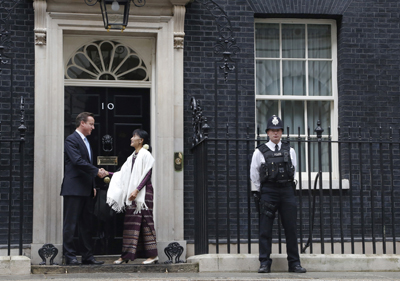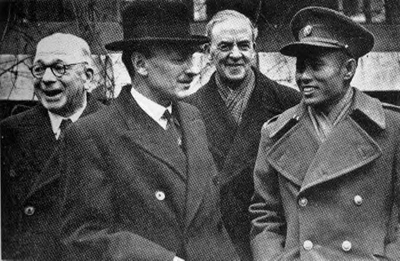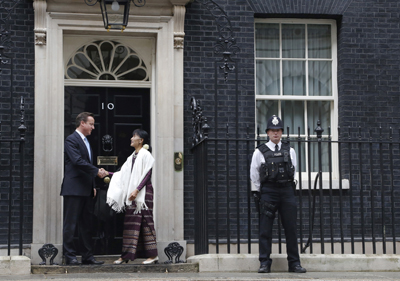Ahead of her historic address to Britain’s Parliament, Burmese pro-democracy icon Aung San Suu Kyi held a joint press conference with Prime Minister David Cameron at 10 Downing Street on Thursday.
She addressed reporters outside the prime minister’s residence, close to the very spot where her father, Gen. Aung San, had stood for photographs with British Prime Minister Clement Attlee in January 1947 during a visit to London to negotiate Burma’s independence.

On Thursday, the current British premier re-iterated Britain’s support for reforms in Burma and said that the UK government would open an office in Naypyidaw.
Cameron said that after consulting with Suu Kyi, he had invited President Thein Sein to Britain. The British prime minister said of him: “He too showed considerable courage in leading the latest reforms.”
But Cameron warned against reckless optimism, saying, “We will remain vigorous and rigorous in our questioning until we have made those changes irreversible. That is why we have suspended rather than lifted the sanctions.”
He said Britain had three priorities regarding Burma. First, to strengthen Burma’s emerging democracy by investing in people and money ahead of the election. To start this process, he said, a delegation from both houses of parliament will go to Burma next month to look at potential ways of building up the democratic process.
The second priority, Cameron said, is to resolve the ethnic conflicts in Burma. To this end Britain will invest three million pounds for immediate peace-building work, press for the release of all political prisoners, and share experiences from the conflict in Northern Ireland, he said..
The third task would be to build an economic future for all of Burma’s people, he said. “Britain has long been Burma’s biggest aid donor and we will increase our support in each successive year to the 2015 election to support education, healthcare, new business and the rule of law,” he said before emphasizing the importance of investment in Burma.

“Britain will do its part, and we will, if the environment permits, operate in a way that benefits the people of Burma,” Cameron told reporters.
For her part, Aung San Suu Kyi emphasized the need for democracy and human rights-friendly investment.
Turning to the issue of the ethnic conflicts in Burma, she said, “We have to have the courage to investigate the roots of these conflicts and we need the wisdom to pull through the negotiation process that will result in a permanent political settlement.”
She expressed regret at the resumption of fighting in Shan State despite recent ceasefire agreements. “It is not the ceasefires that are the answers to our problems,” she said. “It is political settlement that will meet the aspirations of all ethnic nationalities.”
Suu Kyi stressed that the future of Burma should not be in the hands of one small group such as the military or her party, the National League for Democracy, but in the hands of civil society.















